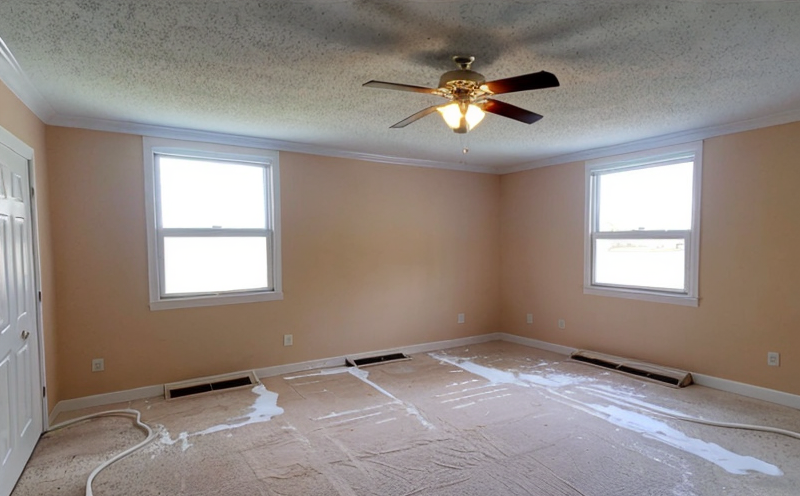ISO 8302 Steady-State Thermal Conductivity Testing
The ISO 8302 standard provides a method for determining the steady-state thermal conductivity of materials using transient plane wave (TPW) technology. This non-destructive testing technique is widely used in additive manufacturing (AM) and 3D printing sectors to ensure that newly developed materials meet the necessary performance criteria.
Thermal conductivity plays a crucial role in assessing the suitability of materials for various applications, including heat management systems, electronic components, and aerospace structures. By accurately measuring thermal conductivity, manufacturers can optimize material selection and improve product quality.
The TPW method used in ISO 8302 involves transmitting a short-duration plane wave into a specimen and measuring the resulting temperature rise or fall. The thermal conductivity of the material is then calculated based on this data. This approach ensures precise measurements even for materials with complex microstructures, such as those produced through AM processes.
For accurate results, it is essential to follow strict specimen preparation procedures. Typically, specimens are cut into small rectangular prisms and polished to ensure a smooth surface finish. The orientation of the sample also plays a critical role in obtaining reliable thermal conductivity values.
The equipment used for ISO 8302 testing includes a transient plane wave instrument capable of generating high-precision temperature measurements. This apparatus is paired with software that calculates thermal conductivity based on user input parameters such as material properties and experimental conditions.
| Parameter | Description |
|---|---|
| Sample Size | Rectangular prism dimensions: typically 50 mm × 100 mm × 2 mm |
| Surface Finish | Polished to a maximum roughness of 1 μm |
| Material Orientation | Aligned with the primary direction of heat flow |
The test procedure outlined in ISO 8302 ensures consistent and reproducible results. It is important to note that deviations from these guidelines may lead to inaccurate measurements, which could compromise product performance.
By adhering to the standards set forth by ISO 8302, manufacturers can ensure their products meet stringent quality control requirements. This not only enhances customer satisfaction but also contributes to a safer and more efficient end-product.
Why It Matters
Accurate thermal conductivity testing is vital for ensuring the reliability and performance of materials used in additive manufacturing (AM) processes. In many applications, especially those involving electronics, aerospace, and automotive industries, heat dissipation plays a critical role in maintaining functionality and longevity.
- Electronics: Ensures that thermal management systems are effective in dissipating heat generated by electronic components.
- Aerospace: Critical for designing structures capable of withstanding extreme temperature variations without compromising safety or performance.
- Automotive: Important for developing vehicles with efficient heating, ventilation, and air conditioning (HVAC) systems.
By leveraging ISO 8302 steady-state thermal conductivity testing, manufacturers can identify materials that best suit their specific needs. This knowledge enables them to make informed decisions regarding material selection and process optimization, ultimately leading to improved product quality and reduced costs associated with rework or failures.
Industry Applications
The ISO 8302 steady-state thermal conductivity testing method finds application across numerous sectors where accurate thermal property data is essential for material selection and process optimization. Below are some key industries benefiting from this testing technique:
- Additive Manufacturing (AM): Ensures that materials used in AM processes meet the necessary performance criteria.
- Electronics: Guarantees effective thermal management systems for electronic devices and components.
- Aerospace: Supports the design of structures capable of withstanding extreme temperature variations without compromising safety or performance.
- Automotive: Facilitates the development of vehicles with efficient heating, ventilation, and air conditioning (HVAC) systems.
- Metalworking: Assists in selecting materials for heat-treating processes that require precise temperature control.
- Plastics and Rubber: Ensures proper thermal management during processing and end-use applications.
| Industry | Benefit |
|---|---|
| Additive Manufacturing (AM) | Ensures material performance in AM processes |
| Electronics | Effective thermal management systems for devices and components |
| Aerospace | Designs structures with temperature variations tolerance |
| Automotive | Efficient HVAC systems in vehicles |
| Metalworking | Select materials for heat-treating processes |
| Plastics and Rubber | Proper thermal management during processing |
Eurolab Advantages
At Eurolab, we offer comprehensive ISO 8302 steady-state thermal conductivity testing services tailored to meet the needs of various industries. Our expertise in this area ensures accurate and reliable results, supporting your product development and quality assurance processes.
- Accurate Results: Leveraging cutting-edge instrumentation and experienced personnel, we deliver precise measurements that reflect real-world conditions.
- Comprehensive Reporting: Our reports are detailed and easy to understand, providing all necessary information for informed decision-making.
- Industry Experience: With years of experience in additive manufacturing (AM) and 3D printing testing, we have the knowledge to guide you through every step of the process.
- Custom Solutions: Whether you are developing new materials or optimizing existing processes, our team can provide customized solutions that meet your unique requirements.
- Regulatory Compliance: Ensuring compliance with international standards such as ISO 8302 is a priority for us. Our services help you stay ahead of regulatory changes and market trends.
We are committed to delivering high-quality, reliable testing that enhances your product performance and ensures customer satisfaction. Let Eurolab be your partner in quality assurance and innovation.





